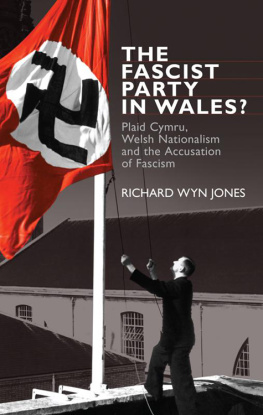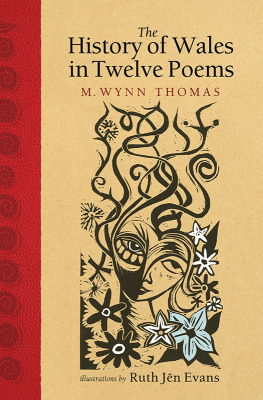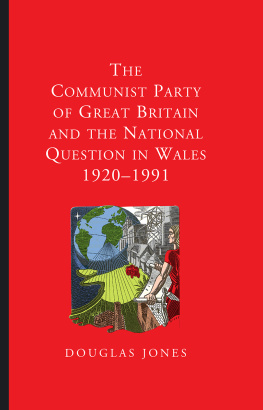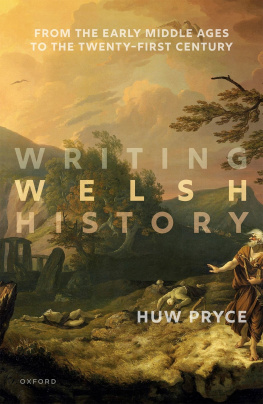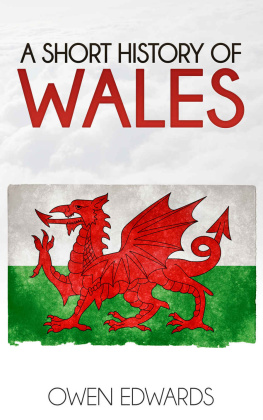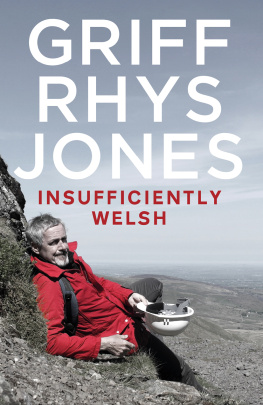Richard Wyn Jones, 2014
All rights reserved. No part of this book may be reproduced in any material form (including photocopying or storing it in any medium by electronic means and whether or not transiently or incidentally to some other use of this publication) without the written permission of the copyright owner except in accordance with the provisions of the Copyright, Designs and Patents Act 1988. Applications for the copyright owners written permission to reproduce any part of this publication should be addressed to the University of Wales Press, 10 Columbus Walk, Brigantine Place, Cardiff CF10 4UP.
www.uwp.co.uk
British Library Cataloguing-in-Publication Data.
A catalogue record for this book is available from the British Library.
ISBN 978-1-7831-6056-3
e-ISBN 978-1-78316-156-0
The right of Richard Wyn Jones to be identified as author of this work has been asserted in accordance with sections 77, 78 and 79 of the Copyright, Designs and Patents Act 1988.
This book was first published in Welsh in 2013 by the University of Wales Press as Y Blaid Ffasgaidd yng Nghymru: Plaid Cymru ar Cyhuddiad o Ffasgaeth (ISBN 978-0-7083-2650-3; e-ISBN 978-0-7083-2656-5), in the series Safbwyntiau: Gwleidyddiaeth Diwylliant Cymdeithas.
The University of Wales Press acknowledges the financial support of the Welsh Books Council.
Cover image:
The German swastika flag above Cardiff City Hall, 2 October 1938. Photograph Fox Photos/Getty Images.
Preface
To celebrate the signing of the now infamous Munich Agreement on 30 September 1938, the then Lord Mayor of Cardiff, Alderman O. Cuthbert Purnell, ordered that the flags of the four states represented at the negotiations in the Bavarian capital be flown above City Hall. So it was that the flags of the United Kingdom, France, Italy and Germany were raised over the city. A Czechoslovak flag could not be located or it, too, would apparently have been flown alongside them to celebrate that countrys forced dismemberment in the cause of peace in our time. The provocation of seeing the swastika since September 1935, also the German national flag fly above the city proved too much for two outraged Labour members of the council, Alderman C. H. McCale and Councillor John Hegin-bottom, who duly hauled it down. At a subsequent, heated meeting of the council, their actions were vigorously defended by a number of their party colleagues. One of these, A. J. Williams, protested that it would surely have been better to raise the Russian flag, because they were the only people who had done the honourable thing.
Others took a very different view of the actions of Messrs McCale and Heginbottom. Speaking at a dinner engagement, the Lord Mayor condemned their behaviour, claiming that there is such a thing to being a traitor to peace. Major R. A. Hobbs told the same audience that they should not listen to fire-eaters, most of whom had done all they could to prevent Britain from being adequately armed. Readers of the same issue of the Western Mail also learnt that officials of the Welsh League of Nations Union a bastion of liberal-left opinion had asked for it to be made clear that, contrary to some reports, no protest or objection as to the flying of the Swastika [sic] flag on the City-hall was made on their behalf by anybody. A council employee duly returned the swastika to pride of place above Cardiffs civic centre. That moment was captured by a photographer, and the ensuing photograph can be seen on the cover of this book.
There are two reasons for using this cover image. The first is that the book focuses on the persistent accusation that one section of the Welsh population, namely Welsh nationalists, harboured Fascist sympathies; indeed, according to one of their most influential critics, that Plaid Cymru was the Fascist party in Wales. This view appears to be deeply entrenched. Thus, for example, two recent widely-read and very well-received popular history potboilers, Richard Weights Patriots: National Identity in Britain 19402000 and Nick Grooms Union Jack: The Story of the British Flag, claim that Plaid Cymru sent an official delegation to Berlin in 1940.
The claim is wholly baseless: nothing of the kind ever happened. We may (rightly) bemoan the scandalous lack of respect for basic scholarly standards that allowed such a damaging and false allegation to be circulated without an attempt at justification; in neither case is the allegation even referenced. But it is also important to ask why it was that such a claim must have appeared at least superficially plausible to the authors and their respective publishers. The answer to that puzzle, I would suggest, is that the claim that Welsh nationalists had at least some Fascist inclinations or sympathies has now been so consistently repeated that it requires no justification: it is held by many as a simple, self-evident truth. This accusation has been accepted and reproduced time and again; this book constitutes the first systematic attempt at examining and weighing the evidence.
The second reason for using the photograph is quite simply the way in which it jars with our contemporary sensibilities and expectations. Until confronted with the image, most people of my acquaintance, at least not only recoil (understandably) from the idea of the swastika being raised above the Welsh capital, they find it hard to imagine or accept that such a thing could ever have occurred. But it did, and this in turn should remind us of the precarious nature of much of what we call history.
What we understand as the past even and perhaps especially, the recent past turns out on closer examination to be an often unsettling combination of truth, half-truth and downright untruth, a product of myth-making and forgetting quite as much as memory and remembrance. The task of scholarship is to seek to untangle these various strands whilst accepting, of course, that the final word will never be written. In the present case, the task of evaluating and making sense of the accusation of Fascism against Welsh nationalism is rendered easier by the fact that, for my generation at least, neither the dramatis personae nor the events in question were personally known or experienced. Viewing this controversy from a critical distance should now surely be possible. That, at least, is the spirit in which this book has been written.
* * *
This preface is the only part of the following book to have been written originally in English. Translating the rest from its original Welsh has served to remind me both of the incredible riches of the two languages, but also of the enormous differences between them. To state the case with a crudity that will no doubt make linguists wince, Welsh and English work so very differently! The translation seeks to keep at least some of the originals flavour whilst ensuring that the work is as readable as possible in its new linguistic context. Only others can judge how successfully the latter goal has been attained. But, to the extent that it has, it is largely down to the generous assistance of others. Dafydd Jones produced a first draft of the translation with amazing alacrity. My good friends and colleagues Roger Scully and Emyr Lewis helped smooth remaining rough edges in each successive draft. I am also grateful to suggestions from Ceri Davies, Lucy Hammond, Sarah Lewis, Wynn Thomas and Lisa Turnbull. Any remaining lack of fluency is, alas, solely my own responsibility.
Other debts have been incurred whilst producing this translated version of the text. As well as being strikingly efficient, colleagues at the University of Wales Press have been unfailingly enthusiastic about the project. I would like to thank, in particular, Helgard Krause and, again, Sarah Lewis and Dafydd Jones. I am also grateful to Adam Evans, Ken Jones, Rob Stradling and Chris Williams for their advice and assistance.

